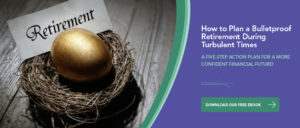How to Recession-Proof Your Retirement Savings
A lot of people have been Googling, “are we headed for a recession?” This is because a growing number of people in the financial industry see a recession this year as inevitable. Opinions vary as to how long it could last or how severe it’s likely to be, but nearly everyone agrees that it’s happening. At this point, it’s more of a question of “how soon” than anything else.
However, another good question may be, “Should I be concerned about how it will affect your retirement savings?”
With adequate preparation, the answer should be “No.” However, that’s assuming that your portfolio is well-balanced for the economic weather. If you’re not sure that yours is ready, there are a variety of strategies available for protecting your wealth and pursuing the growth of retirement savings in times like these.
Unfortunately, we already saw skyrocketing inflation last year. As a result, financial independence today is no longer a guarantee that your retirement will be comfortable in your golden years (because the purchasing power of the dollar is being reduced). That’s why this article focuses on how high-net-worth families and individuals can recession-proof their retirement plans.
This article answers these questions:
- What is an economic recession?
- Will there be a recession in 2023?
- Do recessions typically last forever?
- Can a portfolio be recession-proofed?
What Is an Economic Recession?
A recession is a period of significant decline in the overall output of an economy, impacting both affluent investors and everyday citizens. This can involve a number of areas, such as income levels, employment rates, and a country’s gross domestic product.
As banks reduce lending, money dries up.Commodity prices usually decrease.Businesses typically need to cut expenses and reduce the number of workers employed.. This drives down consumer confidence further, continuing to spiral until steps are taken to remedy the situation. Predicting when a recession will end is difficult; however, understanding its effects is crucial for planning accordingly.
Unhappy With Your Current Advisor? We Have Tips for Determining When It’s Time To Go.
Will There Be a Recession in 2023?
A looming recession has been predicted by many pundits in the wake of the pandemic-induced global economic slump, supply chain shortages and subsequent recovery for a while. Unfortunately, semantic games aside, the recession news is that we are due for one in the next 12 months.
It can be difficult to accurately predict the magnitude or timing of this kind of economic event. Nevertheless, it’s uncomfortably clear that industries across a wide spectrum are likely to feel its impact. Everything from oil production to consumer goods could see their fortunes affected, creating significant ripple effects throughout business markets and consumers’ pockets alike.
Hopefully, it won’t last years, but it could be a couple of years or longer before significant improvement and full recovery is widespread. That’s why your preparations should begin now, if you want to ensure resilience in your portfolio over the long term.
Do Recessions Typically Last Forever?
It’s a common fear that economic recessions are endless, but the truth is that they always pass like stormy weather, eventually. The length of one depends on various factors, such as its cause, the government’s response, and other external and internal economic influences.
While they can cause a certain amount of pain and hardship for many, affluent investors can find a silver lining: Down markets can provide rare opportunities to invest in promising businesses while they are most distressed.
For the same reason that panic-selling is often a disastrous decision, investors who seek bargains are unlikely to be disappointed: Some companies with the potential to make significant gains after the recession often have temporarily lowered stock prices. The caveat to this is that a genuinely underwhelming stock (that underperformed when the economy was healthier) won’t be any wiser of a purchase now.
Regardless, there are potential diamonds to be found if you’re willing to dig. As long as you conduct your due diligence first, doing the necessary research before committing your money, this is a buyers’ market for assets. The moral of the story is never to fear a recession. Instead, prepare yourself financially, so that when it does hit, you can potentially capitalize on it.
Can a Portfolio Be Recession-Proofed?
 I don’t want recession “proofed” to be misleading here: When I use it, I’m referring to minimizing the resulting economic impact(s) proactively. This is done to ensure that your savings and investments potentially see minimal (if any) losses. When it’s done well, you stand a decent chance of avoiding any serious damage.
I don’t want recession “proofed” to be misleading here: When I use it, I’m referring to minimizing the resulting economic impact(s) proactively. This is done to ensure that your savings and investments potentially see minimal (if any) losses. When it’s done well, you stand a decent chance of avoiding any serious damage.
However, I can’t predict the future any more than you can. So, please understand that this is not a guarantee. I’ve worked in the financial industry to know the waters pretty well. At the same time, even a well-seasoned sea captain can still be surprised by a freak storm on rare occasions.
With that said, the surest way for a recession to sink your retirement ship is by ignoring the situation and failing to prepare. I’d love to close my eyes… open them, and find the economy thriving again as much as you would. For the time being, unfortunately, that’s not a realistic expectation.
The worst thing about crossing stormy economic seas, other than the threat of capsizing, may be the long wait until you’ve finally sailed clear of them. Regardless, weathering this period is a top priority for any investor planning their retirement. The best ways to recession-proof your portfolio include tax-efficient withdrawals, tax loss harvesting, and scheduling Roth conversions.
Tax loss harvesting can reduce the size of your taxable income when you sell investments at a gain. By selling an underwhelming stock at a loss, deliberately, you can deduct some of those capital losses from your annual income taxes. In other words, it can potentially reduce the bite of long-term capital gain taxes on your sales profits.
Roth conversions, meanwhile, can allow you to convert tax-deferred retirement amounts into tax-free ones. These can then be sheltered from market downturns, inflation, or a recession. While they shouldn’t be considered a one-size-fits-all solution, they can help reduce how much you wind up paying the IRS.
Heritage Capital is ready to help you with recession-resistant high-net-worth retirement planning in Connecticut. Contact us or schedule a free consultation to learn more about our wealth management for high-net-worth individuals.


